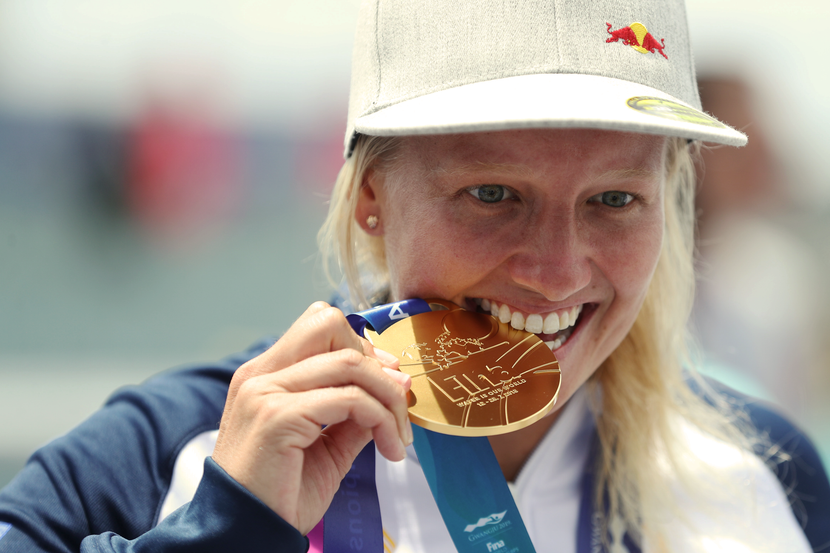
Like Gary Hunt, Rhiannan Iffland (AUS) had to wait until the last round of the FINA World Championships in Gwangju (KOR) to ensure her gold medal in the main event of the 2019 season. Before that, she had brilliantly won the World Cup in China. So, the 2019 FINA Female Best High Diver award pays tribute to the most consistent athlete in the women’s field. Iffland allies a very efficient technique with steel nerves and is clearly the winner for the third year in a row.
In 2017 and 2018, the Australian’s supremacy was already clear, with her main challenger being Mexico’s Adriana Jimenez, winner of the World Cup in 2017. Jimenez was silver medallist at the World Championships in Budapest but then skipped the 2018 edition of the World Cup. In 2019, she appeared determined to fight with Iffland for world dominance.
At the World Cup in Zhaoqing (CHN), on May 25-26, Jimenez made an excellent start to the competition, leading after the initial two rounds. She had scored 162.30 points, but Iffland was not far behind, on 161.75, having performed a reverse ½ somersault 1 twist for a total of 65.00 and a more challenging back 3 somersaults 2 twists, worth 96.75.
In round 3 (on the second day of competition), Jimenez didn’t appear so inspired, while Iffland shone with a forward 2 somersaults 1 ½ twists (70.20 points) to go 9.85 points in front. On her fourth and last attempt, Iffland didn’t wobble and perfectly executed an inward 3 somersaults ½ twist for a total of 96.90 and an accumulated score of 328.85. Jimenez messed up her reverse 3 somersaults and had to be content with bronze, while Jacqueline Valente, from Brazil, was an ecstatic silver medallist.
"I could feel the pressure and all eyes were on me, but I could manage it. The winning feeling is perfect and being the first champion of the permanent high dive venue is cool. It is a very special World Cup this time. I hope I can come here for more training," Iffland said after her convincing win in Zhaoqing.
In July, in Gwangju, Jimenez again led after the first two rounds (148.20 points), creating a significant advantage over an off-key Iffland. The Australian, replicating her World Cup programme, was worse this time. Her second dive received only 66.65 from the judges, a weak performance compared with the World Cup (96.75), and she was visibly frustrated to end the first day fifth in the rankings.
Next day, Iffland was determined to overcome this frustration and performed the best third-round dive. That lifted her to fourth, while Jimenez kept the lead, 12.65 points ahead of Iffland, with Jessica Macaulay (GBR) and Genevieve Bradley (USA) second and third, respectively.
Come the last round, and the theoretical advantage goes to the Mexican, presenting a dive with a higher degree of difficulty (4.0 to Iffland’s 3.8). But not always is the degree of difficulty synchronised with the quality of the execution. While the Australian excelled in her inward combination (98.80, slightly better than in the World Cup), Jimenez (diving last) could not match it and notched only 86.00 for her back 3 somersaults. That just clinched it for Iffland, who retained her title with a total of 298.05. Jimenez took her second consecutive silver with 297.90. The 0.15 winning margin was the tiniest ever in the history of the competition.
We love this kind of competition – a healthy competition
“It's a great feeling to have this gold. It was a fight until the end, but we love this kind of competition – a healthy competition. I feel very proud, and I am sure back home my Mum will also be thrilled. I felt a bit nervous, but I kept the dive I feel more comfortable with for the end. It’s difficult to handle all those emotions at the top of that platform, but I manage to flip them around and bring in some positive energy. That’s why I love this sport. That’s awesome to be a woman and to be involved in such an extreme sport. High diving has taught me a lot in life – it brought me a lot of confidence. In this event, I must confess I was surprised with the final result – I thought Adriana had the gold!” admitted a smiling Iffland after this thrilling competition.
Aged 28, Rhiannan Iffland first appeared on the circuit in 2016, finishing 10th at the World Cup. It was the first and last time the Australian was “hidden” in the rankings. The following year, she won gold at the Worlds and silver at the World Cup. 2018 and 2019 were perfect years for Iffland with two victories in the World Cup and first place in the World Championships in Gwangju.
*This article can be found in the FINA Magazine. To access the online version of the magazine (2020/2) click here.